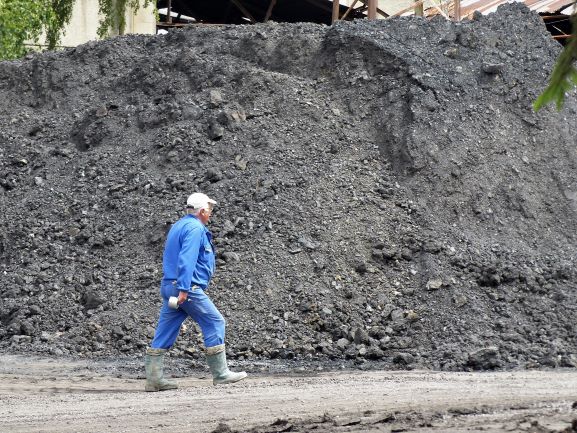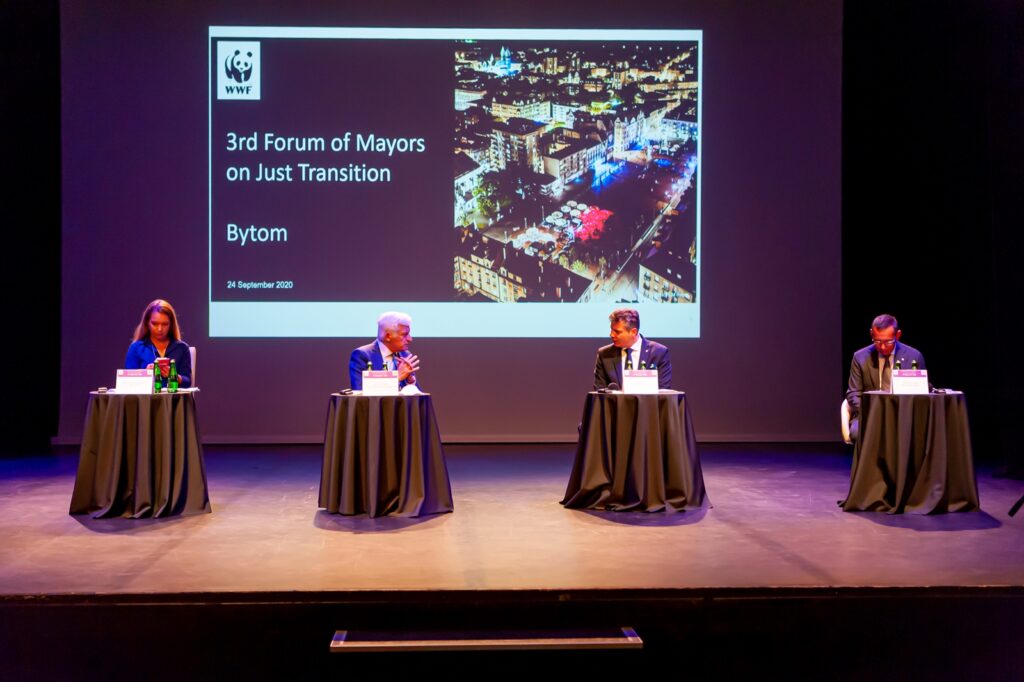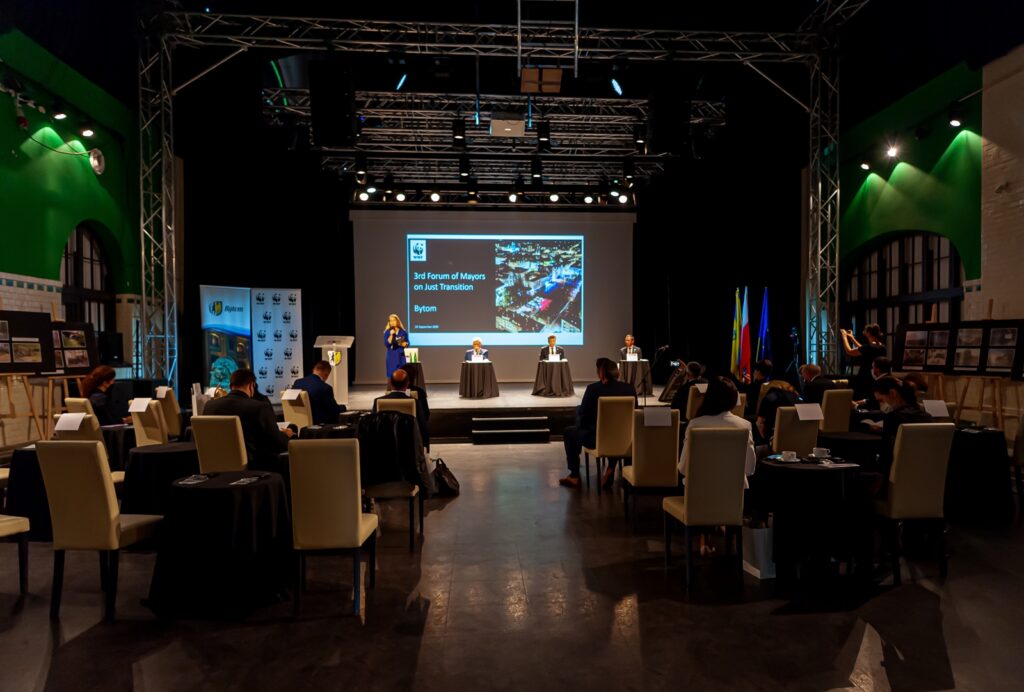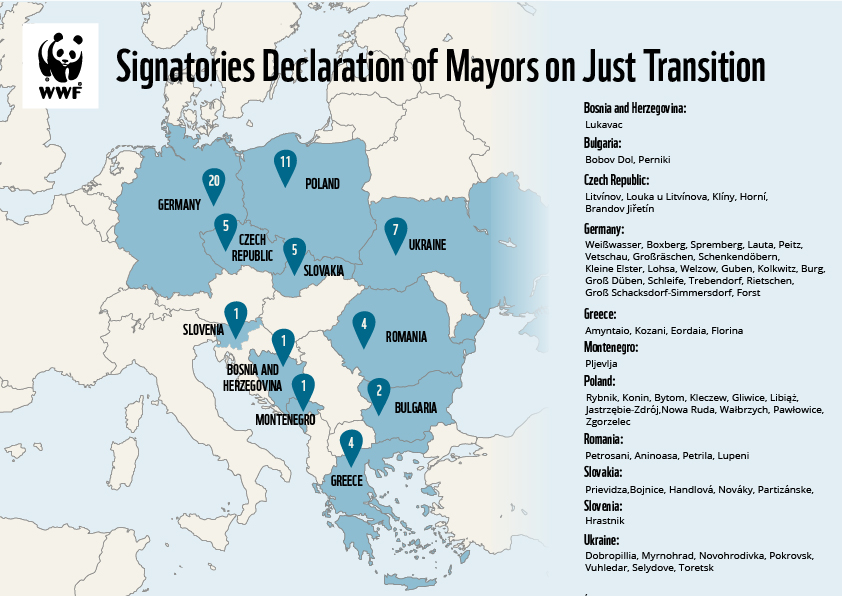In his address to the 74th UN General Assembly, on the 23 September 2019, the Greek Prime Minister announced the closure of all the country’s lignite-fired power plants by 2023, with the exception of the “Ptolemaïs V”, which is projected to operate until 2028[1], although an official decision has not yet been taken about its future. Moreover, the announcement included a revised target of increased renewable energy penetration up to 35% (final consumption) by 2030, from approx. 18% today. In order to implement the plan, in December 2019 Greece’s Council of Ministers set up a governmental monitoring committee.
As a small–but critical – contribution to the lignite phase-out process, WWF Greece has shared ‘best practices’ of a socially inclusive coal phase-out process, widely known as ‘just transition’ from regions that provided electricity to the country for several decades and are about to alter their productive model. Those regions are W. Macedonia and Megalopolis in the Regional Unit of Arcadia.
We’re facing a climate crisis, thus shifting towards clean energy sources while moving away from fossil fuels is urgent. Yet, doing so without the right preparation and consultation runs the risk of generating grave social and financial consequences and could be inefficient.
For WWF Greece, there are three fundamental aspects towards a successful lignite phase-out process:
1. A mid-to-long term strategy towards a productive upturn of lignite regions, by way of new investments
2. Short-term management of consequences
3. Effective participation of local communities
Unemployment in coal regions (2019 data)

As expected, the Covid-19 pandemic will have – and is probably already having – further negative impact on the unemployment rates for the coal regions as well, especially for W. Macedonia, a region where unemployment is already above the Greek average due to the economic crisis and declining coal activity.
The Study – main findings
The project study was structured with two main pillars, namely:
● The direct/short-term impacts the lignite phase-out is bound to have on employment. In that sense, the study delves into the primary consequences of such a process as well as formulating proposals towards an eventual smoothing of the process over the particular transition period (2020 – 2023) as far as job retention is concerned.
● The mid and long-term consequences and proposals towards an efficient implementation of a smooth transition, leaving no-one behind (over the period from 2023 on).
According to our study, ‘Just Transition & Employment in Greece’, published in November 2020 as part of the EUKI project that WWF-Greece is part of, together with WWF-Poland, WWF-Germany and WWF-Bulgaria, the findings can prove useful when designing a lignite phase-out process. More precisely:
● 2,200 workers are at risk of losing their jobs to coal phase-out (both regions). Timing is an important dimension. The key time period is 2020-2023, as planned investments (according to the proposed Greek Master-Plan) won’t be initiated until 2023, although the closure of lignite power plants is expected to continue regardless of this, which creates extra pressure on employment and income to the coal regions. Without an adequate safety net to anticipate income loss, another 6,000 jobs in W. Macedonia are in danger due to the knock-on impact of lignite plant closures.
● In terms of income loss for the coal regions, for every 1€ deducted from lignite activity, 3.1 € are deducted from the local economy (1.7 € in Megalopolis), based on the existing multipliers.
● The role of the Public Power Corporation as the main land-owner in the affected regions is critical, and it could help stimulate growth if properly engaged with local communities.
● The regions of Kozani and Ptolemaida (Eordea) present a higher impact in terms of local jobs and income due to the coal phase-out process, while not all age groups are affected in a similar way. Different characteristics means different strategies need to be applied in those two regions.
● Targeted reskilling of workforce is needed, in sectors that present specific characteristics and local added value in terms of employment and skills such as:
◦ Decommissioning of lignite power plants
◦ Circular economy
◦ Renewables & energy efficiency
◦ Rehabilitation of polluted soil
WWF Greece participated in the public consultation on the proposed Just Transition Development Plan (dubbed “ΣΔΑΜ”). Our view perspective is that the issue of active local community participation should not be limited only to a typical consultation, but should also be an ongoing and active process with local communities.
Recommendations & conclusions
The main findings indicate that a rapid coal phase-out is a difficult, challenging and complex task. Greece is one of the very first EU member states to implement such a strategy, it has to be designed in such a way that will improve people’s well-being, avoid/avert negative impacts through targeted investments and an adequate safety net for workers. Civil society, trade unions, local communities and authorities must come together to design a sustainable way forward for their regions. The government should consider how to facilitate their participation and take their proposals into account, especially in the light of the Just Territorial Transition Plans that need to be drafted. Moreover, PPC must engage with the local communities further, so as to create local added value for the communities that supported the electrification of the country in previous decades, as well as suffering from the impacts of it. Following recent developments in the EU level, it is now clear that gas (like all fossil fuels)[2] will not be funded through the Just Transition Fund so the procedure must rely on green and sustainable solutions (e.g. district heating).
Our main concern is to create a process that could be interpreted as a good example, without anyone being left behind. We must make sure that an adequate Just Transition plan is designed and implemented, that will serve as an example to follow and not an example to avoid, which could have further implications, apart from the local communities of course (e.g. undermining the Just Transition process in the wider European context).
WWF Greece’s study, ‘Just Transition & Employment in Greece’ can be seen as a constructive contribution towards this direction. You can find the report here, while the relevant Policy Brief can be found here. The study was funded through the EUKI program as part of the Regions Beyond Coal project, in which four WWF offices are involved: WWF Greece, Bulgaria, Poland and Germany.
Author: Dimitris Tsekeris, Energy Policy Officer, WWF Greece – Project Leader
[1] Greece commits to phase out lignite https://contentarchive.wwf.gr/crisis-watch/crisis-watch/energy-climate/energy/greece-commits-to-phase-out-lignite
[2] Deal on financing a just energy transition in EU regions


 ENG
ENG
 BUL
BUL
 GER
GER
 POL
POL
 GR
GR






